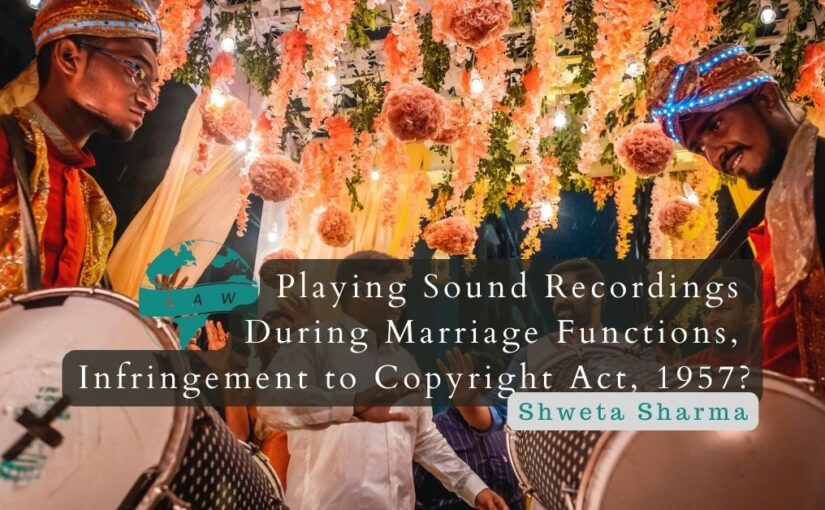Playing Sound Recordings During Marriage Functions, an Infringement to Copyright Act, 1957?
DPIIT (Department for Promotion of Industry and Internal Trade) released public notice on 24 July, 2023, in which it is stated that, playing sound recordings/ musical work does not amount to infringement of copyrights. Before diving into the notification, let’s first understand, what is the issue and legal provisions related to it.
The dispute is going on for a long time, that whether sound recordings/ musical work played during marriage functions, infringed copyright of the original owner, in many cases the Copyright Societies has demanded, from public to take license and pay royalties to them , before playing any sound recordings in marriage functions. On the other side, public and stakeholders claimed that playing a musical work/sound recordings in marriage ceremonies are exempted under section 52 (1) (za) of Copyright Act, 1957.
Infringement under Section 51 Of Copyright Act, 1957
Generally, under Copyright Act, 1957 the use of copyrighted musical work/sound recordings without prior permission of original copyright owner amounts to infringement. The copyright act provides protection from use of copyrighted work by third person without taking permission from the owner. According to section 51 of the act, if any person uses copyrighted work without taking license from original owner of copyright or Registrar of copyright, it amounts to infringement. Under Section 63, Punishment for infringement is minimum Six months that can extend up to three years and fine of fifty thousand which may extend to two lakhs.
Exception to Infringement
There are certain exceptions mentioned in Section 52 of Copyright Act, 1957.where under these exceptions, using a copyrighted work without taking license from original owner, does not amount to infringement. The third person can use copyright work under conditions mentioned in section 52, without taking permission from the owner and it does not constitute infringement. The use of sound recordings/musical work during marriage related functions or religious ceremonies are exempted from copy right infringement under Section 52(1) (za) of the act.
Section 52 (1) (za) states that the performance of a literary, dramatic or musical work or the communication to the public of such work or of a sound recording in the course of any bona fide religious ceremony or an official ceremony held by the Central Government or the State Government or any local authority. Explanation.—For the purpose of this clause, religious ceremony including a marriage procession and other social festivities associated with a marriage.
Copyright Societies
The Copyright Societies are governed under section 33 to 36 of the Copyright Act, 1957. These societies are registered under section 33 of the copyright Act, 1957. The minimum seven members are required for registration of copyright societies. These societies grant license on the behalf of original owners who are registered with them. Copyright societies navigate any infringement happening to copyright work, and take legal actions on it. These societies work on behalf of the Copyright owners like, to grant license, collect fees in pursuance of such license, protect the copyrighted work from infringement, and if infringement happens file a case in court and share the royalties.
Following are Indian registered copyright societies:
- The Indian Performing Right Society Limited (IPRS)
- Society for Copyright Regulation of Indian Producers of Films and Television (SCRIPT)
- Indian Singers Rights Association (ISRA)
- Phonographic performance limited (PPL)
Conflicts
DPIIT issued notification dated 27.08.2019clarifying that sound recordings/musical work played during religious ceremonies including marriage procession and other social festivities associated with marriage does not amount to infringement of copyrights and hence no license is required to obtained from copyright societies. Even after the clarification, in many scenarios copyright societies has demanded and charged the royalties fees to play copyrighted musical work/Sound recordings in marriage functions as it infringe the copyrighted work of the original owner, whereas the stakeholders and public refused to take license and also filed complaints to DPIIT about alleged charging of royalties by Copyright right societies.
Recent Notification Issued By DPIIT
DPIIT cleared the air, by issuing Public notice on 24 July, 2023 The notification prescribes that, Section 52 of Copyright Act 1957 enumerates certain acts which shall not constitute an infringement of Copyright. The marriage and its related social activities come under ambit of section 52 (1) (za) of Copyright Act, thus playing sound recordings/musical work in marriage and its related functions does not amount to infringement. Notification strictly refrain copyright societies from entering into acts which are in contravention to Section 52 (1) (za) of Copyright Act 1957 otherwise legal action can be taken against copyright societies. Under notification, the General Public is also cautioned not to accede to any uncalled demands from any individual/organization/copyright society which are in violation of Section 52 (1) (za) of Copyright Act 1957.
Conclusion
The marriage is a scared union between two individuals which is celebrated, lavishly in India. The demand of copyright societies to take license for playing musical work during marriage ceremonies is illegal, arbitral and violation of section 52 (1) (za) of the copyright Act,1957. The musical work played during marriage function is solely for entertainment purposes, not for gaining any profit.
The parties in a marriage function neither gain any monetary benefit nor used sounds recordings with malafidely intentions. Thus charging royalties fees from General public is not an appropriate step taken by the copyright societies.
The DPIIT also refrain Copyright societies to force any person to get license from them for playing sound recordings/musical work during marriage functions. Let’s see whether Copyright Societies will stop demanding royalties from Public.
REFERENCES
About Author
Shweta Sharma is a B.B.A.L.L.B graduate 2023 from St. Soldier law college Jalandhar, affiliated to Guru Nanak Dev University Punjab. She works as a junior associate at V.V. Gautam & Associates.


Leave a Reply